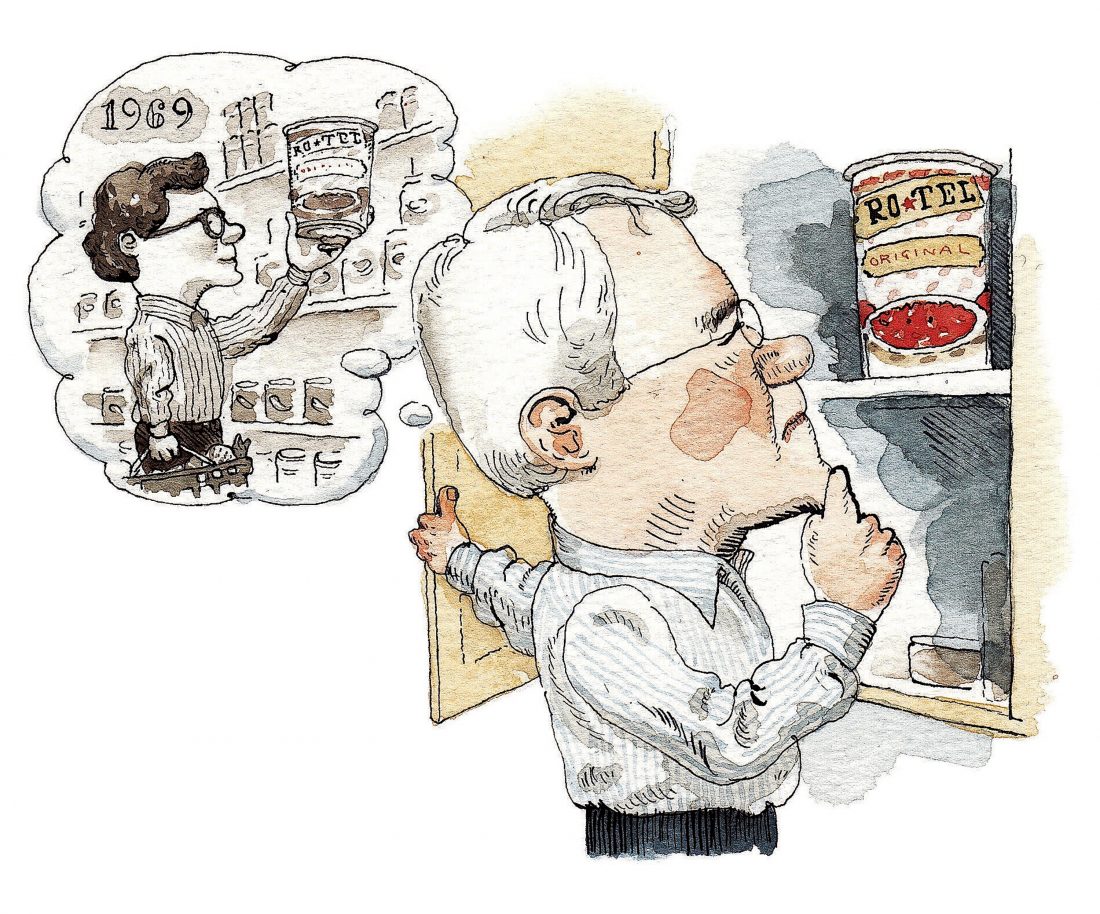Say you look in your pantry and find a can of RO*TEL diced tomatoes and green chilies that says, “Best by Jan. 2011.” What does that actually mean? (a) Do Not Open; Encase in Lead; Call Hazmat. (b) The Odds Are Good That These Goods Are Odd. (c) Probably Still Not All That Bad. (d) We Here at RO*TEL Urge You to Throw This Can Away and Go Buy a New One Even Though a Can of RO*TEL, Unopened and Kept Out of the Midday Sun, Will Be There for You Pretty Much Forever, That’s What the Can’s For.
Left to my own devices, I would assume (c) and (d). However, I am married. Recently my wife went through the pantry and took out everything that had been in there for quite some time. These items, in various containers, included the following:
Dried “One-Step Garlic Basil Entree”
Karo syrup
Only legible words: “Meat Rub”
Cream of coconut
Pine nuts, by volume about 30 percent pantry-fly larvae
Olive spread
“Stuff’s Chicken Marinade”
Hard to tell: “Yamaki Soba” and a word like Tsuyu
Sesame seeds
“Inner Beauty West Indies from Hell Spice Rub ‘Go Ahead, Rub It In’”
Some kind of gray-green oil
Of these, I voted to keep all except the pine nuts, which I was willing to concede had gone off, and, grudgingly, the gray-green oil, though there might be a way to make your car run on that. But there was something to be said for pouring all that into one bucket to see how nasty the result looked and then heaving it, larvae and all, into the compost heap—where, freed from jars and bottles and boxes, these heretofore unappreciated comestibles could find new life, by contributing right merrily to future homegrown collards and beets. Our cat, Jimmy, functioned primarily as an observer.
But I did hate throwing out that 2011- vintage RO*TEL. The date was evidence, no doubt, that RO*TEL doesn’t always jump off our shelf, but let me say this: If I ran a hotel, the sign outside would say HO*TEL. And you combine RO*TEL with Velveeta cheese product—what a couple they make: he full of swash and buckle, she a lissome, even slippery blonde. I got a craving for some of that dip.
The first fancy food market I tried had no RO*TEL, and when I asked the man in the cornucopious cheese department (fifteen kinds of Gouda—you’d think three or four would be goudanough) for Velveeta, he looked at me the way the father of twelve beautiful daughters might look at you if—well, one night long ago a fellow college boy and I found ourselves for some reason in Tullahoma, Tennessee. We asked a local man where we could “meet some girls.”
He reflected. “You mean loose hangers?” he asked.
Our reply was to the effect of, Well, uh, not necessari—sure.
He said, “We don’t have any loose hangers in Tullahoma.”
The cheese man looked at me the way the father of twelve beautiful daughters might if I had checked out all his daughters and then asked if he had any loose hangers.
Before I poured out that old RO*TEL, I found online that RO*TEL had a promotional connection with Crazy Sam Higgins, the proprietor of the highly rated Chuckwagon Inn bed-and-breakfast in Fredericksburg, Texas, and the author of a 1986 cookbook, Snake, Rattle & RO*TEL, in which he says of himself, “If old Crazy Sam tells you a chicken can dip snuff, just go ahead and look under his wing, and…there’ll be a can hidden there.” I met Sam many years ago, through my Waxahachie, Texas, in-laws Johnny Pearson and Rusty Marchman. I called him up and put it to him: Can’t you eat RO*TEL that’s two years past its theoretical prime?
Turns out Sam and RO*TEL have parted ways. The current corporate owners “didn’t understand what I did” for them, he said. In fact he maintains that RO*TEL isn’t as strong as it used to be. He now favors a local brand, Hill Country Fare. And he wouldn’t recommend that anybody eat post-best-by cans of either one. He did, however, say, “Context is all. If you’re on a deer lease, you might eat ’em and be okay. But around the house, you might be sick for two weeks.”
I found fresh RO*TEL and Velveeta, and the dip was good. But with a bittersweet overlay: If RO*TEL gets too old, even Velveeta might dump him.








